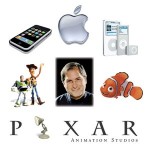CEO Guide: Steve Jobs & The Future of the Media Industry
 The launch of the Apple iPad was tad underwhelming for a lot of analysts. Nevertheless, for anyone who’s interested in the continuing saga of the disruption of the media industry, this was an important chapter in the evolution of what the new media industry will look like. Nobody is better fit to be the principle protagonist of this new chapter than Steve Jobs, successful CEO of a digital electronics (aka, computer) firm and former CEO of a media firm (Pixar).
The launch of the Apple iPad was tad underwhelming for a lot of analysts. Nevertheless, for anyone who’s interested in the continuing saga of the disruption of the media industry, this was an important chapter in the evolution of what the new media industry will look like. Nobody is better fit to be the principle protagonist of this new chapter than Steve Jobs, successful CEO of a digital electronics (aka, computer) firm and former CEO of a media firm (Pixar).
Apple has all the freedom it wants in creating interesting new devices and software. Nevertheless, when it comes to dealing with book publishers, studios and the like, things can seem a bit, shall we say, confining. These companies are scared to death of a further squeeze on margins and having their valuable content swimming around on the Internet for free.
With the iPad, Jobs has launched yet another device for viewing all types of content including, now, books. As more and more millions of users consume media on one or more of these devices, Jobs is creating a gated distribution system where he can experiment with different pricing schemes. As more and more publishers, studios and music companies come on board and accept this state of affairs, it becomes harder for the remaining companies to hold out.
I’m sure some of these hold outs correctly understand the incredible power that could potential be in the hands of one company (Apple) and shudder. However, as Jobs continues to add more consumers and more devices, these companies will find it more and more difficult to stay away from his massive distribution system. The Apple media consumption ecosystem will only become more compelling as it’s pace of digital innovation accelerates.
It certainly is an amazing thing to watch. While many executives understand from a theoretical level that things are changing (particularly in the media industry), Jobs understands what he needs to do to take advantage of what’s happening. While many focus on specific nuances of each beautifully designed gadget that he launches, they risk losing the forest from the trees.
A major transformation is taking place before our eyes. Content creation in the form of books, newspapers, movies, and music as a business has been bound to specific distribution businesses for many years. Sometimes they reside in the same legal entity (e.g., newspapers) and sometimes have ties to well-established distribution partners and Jobs is accelerating the transformation of these distribution channels (in many cases physical channels) into one digital bit stream.
In the process, the actual content will certainly be transformed. Just as music companies are able to provide added content through iTunes; book publishers, newspapers and others will be able to provide added value through these new channels. There will be many players vying for a role in this new ecosystem, but Steve Jobs, with a growing minion of subscribers to his media consumption platform (e.g., iTunes, iBook, Apps, etc.) will be a difficult force for the any media company to ignore.
